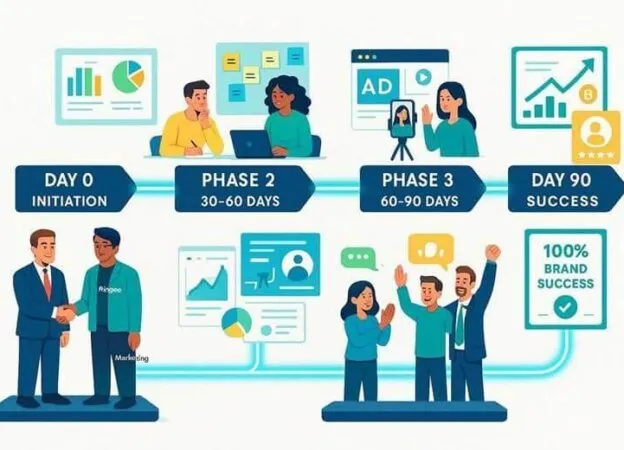In today’s digital age, having an online presence is crucial for law firms to attract and engage with clients. Digital marketing encompasses various promotional activities through online channels.
Table of Contents
Developing an effective digital marketing strategy can help law firms expand their clientele and increase profits. This article outlines best practices for law firm digital marketing.

Why Digital Marketing Matters
Digital marketing is crucial for law firms for several key reasons:
- Wider Reach: Online marketing greatly expands the potential client base from just local markets to national or even global reach depending on practice areas. This ramps up lead generation.
- Cost-Effective: Digital tactics like email, social media, and SEO cost significantly less than print or TV ads per lead generated. This allows stretching marketing budgets further.
- Targeted Marketing: Granular analytics and platform algorithms allow tailoring messaging to niche demographics and locations yielding higher conversion rates.
- Measurable Results: Quantifiable data like website clicks and rankings allow gauging strategy effectiveness and tweaking approaches for continuous optimization.

Building a Strong Online Presence
Gaining visibility and trust in the digital sphere requires foundational components working synergistically. Core elements include an informative website and engaging social media channels alongside strong search engine optimization.
Creating a Professional Website
A website serves as the hub anchoring all other marketing efforts. Firms must prioritize dedicated resources for developing and updating the site. Core aspects include:
Key Elements of a Professional Law Firm Website
- Clean and Professional Design: Navigation, layout, and messaging should reflect brand personality while maintaining prestige.
- User-Friendly Navigation: Library-style menus allowing easy access across sections help visitors quickly find answers to questions.
- Responsive Design: Dynamic resizing for optimal viewing on all devices prevents frustrations for site visitors.
- Informative Content: FAQs, attorney biographies, service descriptions, and free resources address information needs building trust and authority.
Search Engine Optimization (SEO)
SEO improves visibility in search engines so that desired demographics can discover your firm’s website for relevant legal issues. Main tenants include:
Key SEO Strategies for Law Firms
- Keyword Research: Identifying terms and questions buyers commonly input allows tailoring content accordingly.
- On-Page SEO: Craft metadata descriptions, alt text, and content concentrating on researched keywords so search engines index pages accurately. Examples of commonly searched keywords may include: law firm digital marketing, digital marketing for law firm, law firm marketing, etc)
- Local SEO: Optimizing business info like addresses and phone numbers helps surface pages in location-based results.
- Content Marketing: Regularly publishing legal guides and blogs boosts visitors and backlinks improving authority over time.
Social Media Marketing
Active social media deepens client relationships and improves brand recognition through constant visibility in feeds. When you interact with your audience regularly, those touchpoints are chances for real conversation — the kind that grows trust and loyalty. Regular posts keep you at the top of your audience awareness and help differentiate between what is important to show when it comes to values and achievements. Some examples include sharing behind the scenes, client testimonials, or live events which help your audience to better understand what is your business about and how it sets itself apart from other brands. Your brand can be more relatable by using all types of content including videos, and infographics as well as making the posts interactive. Using highly polished (production level) audio visual equipment as an example In the grand scheme of things, your brand needs to exist while navigating this digital world; a powerful social media presence is paramount.
Effective Social Media Strategies for Law Firms
- Choose the Right Platforms: Align lawyer expertise with ideal demographics on respective networks like LinkedIn and Avvo.
- Regular Posting: Share legal commentary, firm achievements, and community news daily for engagement.
- Engage with Followers: Respond promptly to comments, queries, and feedback requests for personalized outreach at scale.
- Paid Advertising: Boost key content with cost-per-click social ads to expand viewers targeted by age, field, and more.
Implementing a Comprehensive Digital Marketing Strategy
Strategically coordinating the various digital activities maximizes collective efficacy.
Developing a Strategy
Formal plans provide clarity and structure:
Steps to Develop a Digital Marketing Strategy
- Define Goals: Quantify targets for new leads, rankings, and conversion rates based on current baselines and projected growth.
- Identify Target Audience: Discern exactly which buyer personas have a strong need-fit with offered legal services.
- Choose Marketing Channels: Determine the optimal mix of tactics matching audience media consumption like email vs. paid search.
- Create a Content Plan: Map out themes with publishing calendars tailored for every channel and campaign.
- Allocate Budget: Divide finances across chosen platforms informed by previous cost and return data.
- Monitor and Adjust: Track quantitative analytics regularly to gauge strategy efficacy then optimize accordingly.
Integrating Marketing Efforts
Integrating various marketing efforts ensures that the firm’s digital marketing strategy is cohesive and effective.
Tips for Integrating Marketing Efforts
- Consistent Branding: Maintain the same color schemes, messaging, and assets across channels and campaigns.
- Cross-Promotion: Feature website and social media links prominently throughout other initiatives driving engagement across properties.
- Unified Goals: Ensure all strategies ladder up to core KPIs around leads, visibility, and conversion optimization.
Measuring Success and ROI
Monitoring key performance indicators gauges effectiveness:
- Website Traffic: Sessions, pages/session and bounce rates determine content resonance.
- Conversion Rates: Free consultation sign-ups, Newsletter opt-ins, and calls booked measure engagement.
- Social Media Engagement: Impressions, reach, and clicks quantify content visibility and interest.
- Email Open and Click Rates: Measure message resonance prompting desired actions.
- Calculating ROI Calculating the return on investment (ROI) of digital marketing efforts is essential to determine their effectiveness and justify the marketing budget.
Steps to Calculate ROI
Calculating the return on investment (ROI) of digital marketing efforts is essential to determine their effectiveness and justify the marketing budget.
Steps to Calculate ROI
- Determine Costs: Calculate the total costs of digital marketing efforts, including advertising spend, software subscriptions, and labor costs.
- Measure Revenue: Track the revenue generated from digital marketing efforts, such as new client acquisitions and increased sales.
- Calculate ROI: Use the formula [(Revenue – Costs) / Costs] x 100 to calculate the ROI. A positive ROI indicates that the digital marketing efforts are effective and profitable.
The Role of a Law Firm Digital Marketing Agency
A specialized law firm digital marketing agency offers efficiencies in handling day-to-day platform management, campaign creation, and performance analysis that provide positive ROI.
Their expansive expertise across many firms also brings an outside perspective identifying unique opportunities and challenges. Services adapt easily to fluctuating workloads too compared to hiring in-house permanently.
By partnering with a legal marketing agency, law firms can leverage tailored strategies that meet their specific needs. This collaboration ensures that marketing efforts are consistently aligned with the firm’s objectives, driving sustained growth and client engagement.

Advantages of Hiring a Law Firm Digital Marketing Agency
- Expertise: Seasoned specialists know best practices across channels securing results faster through proven frameworks. Legal marketing consultants hold niche insight as well.
- Time Savings: Outsourcing digital activities allows lawyers to focus billable hours while ensuring online visibility grows simultaneously.
- Access to Tools: Agencies utilize high-grade software minimizing the need for expensive subscriptions otherwise for robust analytics and ad platforms.
- Scalability: Temporary ramp-ups finish special projects without the headaches of hiring and payroll. Budget shifts also simplify easily each quarter to business needs.
What to Look for in a Digital Marketing Agency
When selecting a digital marketing agency, law firms should consider the following factors:
- Experience: Years handling legal industry nuances indicates plausible reliability for tangible outcomes.
- Reputation: Review industry recognition, client testimonials, and Google ratings assessing satisfactory track records.
- Services Offered: Determine the breadth of digital marketing offerings in addition to monthly contracts for one-off initiatives needed.
- Communication: Evaluate early responsiveness and clarity from prospective account managers.
Conclusion
Law firms must actively develop strong digital footprints that strategically market services, establish credibility, and generate leads consistently. Tailored digital strategies aligned with target audiences and goals deliver measurable growth in a cost-efficient manner over time.
Partnerships with specialized marketing agencies prove instrumental in excelling amidst evolving virtual landscapes by leveraging cutting-edge competencies.



